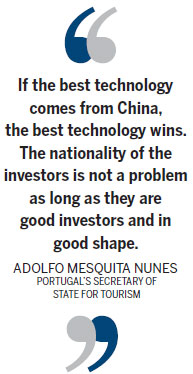Good investors in good shape

| Adolfo Mesquita Nunes, Portugal's secretary of state for tourism, says there are many opportunities for Chinese investment in Portugal. Cecily Liu / China Daily |
Investment from Chinese companies and individuals is flooding into Portugal
Portugal is benefiting greatly from Chinese investors who have been lured to the country by crucial policy reforms in recent years, says Adolfo Mesquita Nunes, Portugal's secretary of state for tourism.
"To make our economy more business-friendly, we have changed the competition law, changed the tax regime and introduced the golden visa program," Nunes says.
"We never had problems with foreign investors, but our regulatory and legal frameworks were not friendly to business. We changed the framework, so it is more open and competitive. Now our attitude is more open to investors."
Although in recent years individual Chinese investors have been attracted to Portugal, the Portuguese-Chinese economic relationship has been boosted by a few major deals. The most recent was China's Fosun International Ltd buying an 80 percent stake in the insurance unit of Caixa Geral de Depositos SA of Portugal for 1 billion euros ($1.36 billion) this year.
Two Chinese companies have made significant inroads into Portugal's infrastructure sector as a result of the Portuguese government's privatization measures in recent years, which came in response to the country's financial crisis.
In December 2011, China Three Gorges Corporation bought a 21.35 percent stake in the Portuguese power company EDP, beating off competition from German and Brazilian companies. The corporation paid 2.7 billion euros to become the largest shareholder in EDP.
In 2012 State Grid International of China bought a 25 percent stake in the Portuguese power and gas grid operator REN-Redes Energeticas Nacionais SA for 387.2 million euros. In the same deal, Oman Oil bought a 15 percent stake in REN.
The sale happened as Portugal requested a bailout from the European Union and the International Monetary Fund. As part of the aid package, the Portuguese government agreed to sell its stakes in energy companies, including REN and the utility EDP-Energias de Portugal SA.
Nunes says it is too early to comment on the effectiveness of Chinese investment in Portuguese infrastructure projects, but "everything has gone smoothly since it began".
Although the Chinese companies' investment exists as equity stakes, Nunes believes it is more than just capital investment because the Chinese investors are expected to influence the board's decisions.

He also believes there will be much more Chinese infrastructure investment in Portugal as the Portuguese government will not block any Chinese investment on the grounds of security concerns.
"They are the first of many to come," Nunes says. "We are an open economy and focused on being competitive. That's the only way you can survive to become a liberalized economy."
In additional to capital investment, the Portuguese government will welcome Chinese companies contributing technology and operational skills to infrastructure projects if they are commercially viable.
"If the best technology comes from China, the best technology wins. The nationality of the investors is not a problem as long as they are good investors and in good shape."
Nunes says in Portugal there are many opportunities for Chinese investment, including much of the country's harbor development. That sector has plans for major expansion in the next seven years.
Alongside the major investments Chinese companies are making in Portugal, many wealthy individual Chinese are taking advantage of the country's golden visa program to migrate there.
The program was introduced a year ago to attract foreign investment that can help the local economy's recovery after the 2008 global financial crisis.
A fast track to getting residency permits, such visas can generally be obtained in three months. Applicants can invest 1 million euros in a company or fund, set up a business and create 10 new jobs, or buy a property with a minimum value of 500,000 euros.
This scheme has been particularly popular with Chinese who want to settle abroad. According to statistics from the Portuguese foreign ministry, 356 residency permits have been granted to investors so far, including 279 Chinese, 16 Russians, 10 Brazilians and nine Angolans.
"Many more Portuguese real estate agencies are specializing in Chinese clients. Two years ago you wouldn't have seen that," says Nunes.
Chinese investors buying into Portugal's real estate market has resulted in increases in house prices in cities like Lisbon, but also in a new trend in which Chinese investors are now buying into luxury resorts, says Diogo Gaspar Ferreira, chairman of the Association of Portuguese Resorts.
Ferreira, who is also CEO of the Vale do Lobo resort in the popular Algarve region in southern Portugal, says the trend of Chinese buying Portuguese resorts has only just started, but it is growing rapidly. Within a year of the introduction of the golden visa, quite a few members of APR had sold units to Chinese buyers, he says.
As most Chinese buyers do not come to live in Portugal, their flats or villas at Vale do Lobo can be rented out with the help of the resort's management team.
"So for Chinese buyers of properties on our resorts, they get a golden visa which allows them to live in the country, they get a resort which will appreciate in value and they get a rental income," Ferreira says.
Resorts have been popular in Portugal since the 1970s, initially with European buyers such as the British, Germans, Scandinavians, Dutch, Irish and French, but now the Chinese are a potentially large customer group, he says.
Portugal is not the only country to be enticing rich immigrants from China and other countries. Spain, Cyprus, Greece and the Netherlands have deployed similar schemes since the financial crisis.
But Nunes says Portugal has the advantage of a stable business environment and can help Chinese investors gain easier access to the European and African markets.
"I don't know if those other countries have the same connections between Asia, Europe and Africa. I'm not sure if these countries have the same safety and climate. We are confident about our product."
As a former colonial power, Portugal has maintained good relations with many African governments. Many of its financial advisers are also familiar with African markets, and their knowledge and networks can help Chinese companies that have set up in Portugal to also invest in Africa, Nunes says.
In tourism, the Portuguese government has recently invested in a program to help the country's retailers understand more about how to work closely with Chinese and other Asian travelers.
The government has been working with a school in Macao to train Portuguese retailers. The school also sends students to a school in Portugal to receive training on the needs of European tourists.
Nunes says the number of Chinese who travel to Portugal as tourists is small but growing fast, increasing in 2011 and 2012 by 60 percent.
He says a big challenge in attracting Chinese tourists is the lack of direct flights between Portugal and Chinese cities, forcing travelers to change flights in Frankfurt, London or the Middle East.
On the other hand, the country's tourism is greatly benefiting from Portugal being a part of the Schengen Zone, which allows Chinese to visit 28 countries in the European Union with one visa. Many Chinese tourists visit Portugal as part of a European tour.
cecily.liu@chinadaily.com.cn
(China Daily European Weekly 05/09/2014 page21)
Today's Top News
- Takaichi must stop rubbing salt in wounds, retract Taiwan remarks
- Millions vie for civil service jobs
- Chinese landmark trade corridor handles over 5m TEUs
- China holds first national civil service exam since raising eligibility age cap
- Xi's article on CPC self-reform to be published
- Xi stresses improving long-term mechanisms for cyberspace governance































